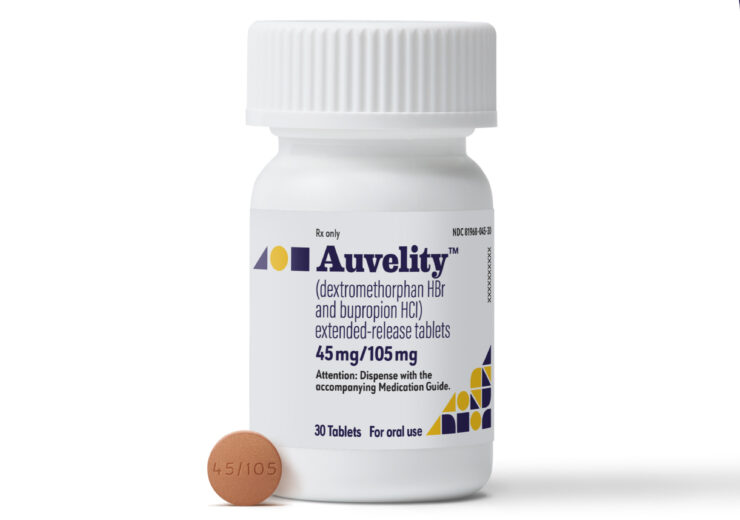Auvelity is the first and only rapid-acting oral drug approved for MDD, with a significant antidepressant efficacy compared to placebo, and is the first and only oral NMDA receptor antagonist approved for MDD, claimed Axsome

Auvelity is a novel, oral, NMDA receptor antagonist. (Credit: Axsome Therapeutics, Inc.)
US-based biopharmaceutical company Axsome Therapeutics has secured the US Food and Drug Administration (FDA) approval for Auvelity to treat major depressive disorder (MDD) in adults.
Auvelity is a novel, oral, N-methyl D-aspartate (NMDA) receptor antagonist, offered as extended-release oral tablet containing dextromethorphan HBr (45mg) and bupropion HCl (105mg).
In March 2019, the US regulator granted Breakthrough Therapy designation for the drug for the treatment of MDD, along with Priority Review for its New Drug Application (NDA).
Axsome claimed that Auvelity is the first and only rapid-acting oral drug approved for MDD, with labelling of statistically significant antidepressant efficacy compared to placebo.
Also, it is the first and only oral NMDA receptor antagonist approved for MDD, and its rapid antidepressant effects were sustained at all subsequent timepoints.
The company intends to commercialise the drug in the US in the fourth quarter of this year.
Axsome chief executive officer Herriot Tabuteau said: “We are extremely proud to deliver this Breakthrough Therapy-designated new treatment to the millions of patients living with depression at a time when it is most needed, given the recent sharp increase in depression prevalence.
“We are thrilled to contribute to potentially fundamental advances in neuropsychiatry by providing clinicians the first rapid-acting oral antidepressant demonstrated with FDA labeling, and the first oral glutamatergic medicine approved for depression.
“Auvelity and the rest of the Axsome neuroscience portfolio reflect our steadfast commitment to developing and delivering potentially life-changing medicines to people living with serious central nervous system disorders.”
Auvelity was evaluated in a large clinical trial programme, enrolling more than 1,100 patients with depression.
In the GEMINI study, the drug showed efficacy in treating MDD, and improved depressive symptoms as measured by Montgomery-Åsberg Depression Rating Scale (MADRS), which is the study’s primary endpoint.
In the ASCEND study, which compared Auvelity to bupropion sustained-release tablets, showed confirmatory evidence in treating MDD.
The drug showed statistically significant superiority to bupropion sustained-release tablets 105mg twice daily on the primary outcome measure.
The primary outcome measure of the study was based on assessing the change from baseline in MADRS total scores from Week 1 to Week 6, and taking average of the scores.
In addition, the change in MADRS total score from baseline to Week 1 and from baseline to Week 2 include pre-specified secondary efficacy endpoints of the study.
The most common adverse reactions associated with the drug in the study include dizziness, headache, diarrhoea, somnolence, dry mouth, sexual dysfunction, and hyperhidrosis.
Axsome stated that antidepressants will increase the risk of suicidal thoughts and behaviours in paediatric and young adult patients, and is not approved for use in children.
